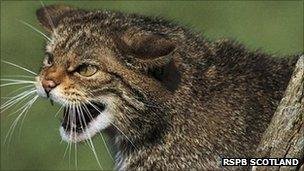Dolly scientist working on cloning Scottish wildcats
- Published

Wildcat populations have been devastated by disease and habitat loss
A scientist who was involved in cloning Dolly the sheep 15 years ago has started work on a new technique to clone rare Scottish wildcats.
Embryologist Dr Bill Ritchie said the project could help protect the species which is thought to number about 400 cats in the wild.
Midlothian-based Moredun Research Institute is involved.
The Royal Zoological Society of Scotland (RZSS) has previously suggested cloning wildcats.
Dolly the Sheep was the first cloned mammal ever to be made from an adult cell and was the result of work at the Roslin Institute near Edinburgh.
Dr Ritchie's research has received some funding from Genecom, the commercial arm of the Moredun Research Institute and the Institute for Animal Health.
The scientist said: "Several cat species have been cloned using the domestic cat, as well as the wolf using dog eggs.
"It is very difficult to find pure wildcats due to their crossing with domestic animals, but modern scientific techniques are able to select animals which are pure bred.
"Cells collected from these animals by taking a small piece of skin would be cultured to supply cells for the cloning process."
'Pure wildcat kittens'
Dr Ritchie said eggs from domestic cats, which would be available from tissue recovered during spaying of the animal, could be used as the starting material for the cloning process.
A project in the Cairngorms where cats are spayed to prevent inter-breeding with wildcats could provide a "convenient source of eggs", Dr Ritchie said.
In August last year, bosses at the RZSS's Highland Wildlife Park confirmed a plan to clone wildcats was in the early stages of being discussed.
Talks had been held with the Medical Research Council's Human Reproductive Sciences Unit in Edinburgh.
The park said a house cat-wildcat hybrid could be used to give birth to "pure wildcat kittens".
It has been estimated that 150 breeding pairs of wildcats survive in parts of the Highlands.
Disease, loss of habitat and inter-breeding with domestic cats have been blamed for devastating wild populations.
- Published18 August 2010